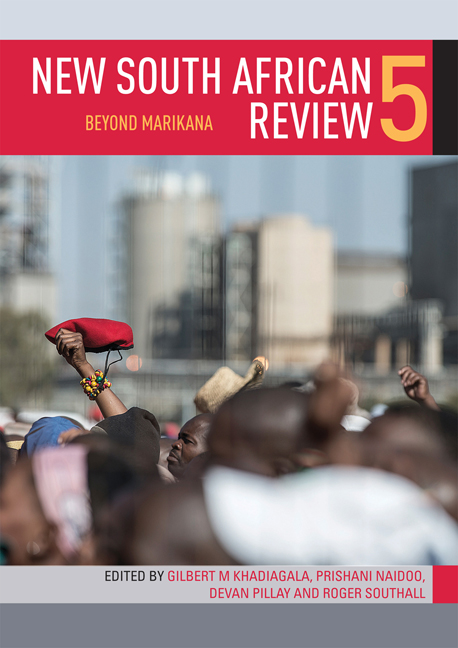Book contents
- Frontmatter
- Contents
- Preface
- Introduction: Political reconfigurations in the wake of Marikana
- PART 1 NEW POLITICAL DIRECTIONS?
- PART 2 ECONOMY, ECOLOGY AND LABOUR
- PART 3 STATE AND SOCIETY
- PART 4 SOUTH AFRICA IN THE INTERNATIONAL ARENA
- Introduction to Part 4
- Chapter 13 The evolution of South Africa's foreign policy
- Chapter 14 South Africa, the BRICS and human rights: In bad company?
- Chapter 15 Trading with the frenemy: How South Africa depends on African trade
- Contributors
- Index
Chapter 14 - South Africa, the BRICS and human rights: In bad company?
from PART 4 - SOUTH AFRICA IN THE INTERNATIONAL ARENA
Published online by Cambridge University Press: 21 April 2018
- Frontmatter
- Contents
- Preface
- Introduction: Political reconfigurations in the wake of Marikana
- PART 1 NEW POLITICAL DIRECTIONS?
- PART 2 ECONOMY, ECOLOGY AND LABOUR
- PART 3 STATE AND SOCIETY
- PART 4 SOUTH AFRICA IN THE INTERNATIONAL ARENA
- Introduction to Part 4
- Chapter 13 The evolution of South Africa's foreign policy
- Chapter 14 South Africa, the BRICS and human rights: In bad company?
- Chapter 15 Trading with the frenemy: How South Africa depends on African trade
- Contributors
- Index
Summary
The shift in international economic power has been accompanied by an increased demand by the so-called emerging powers for a greater voice in global governance and, increasingly, debates about issues of global concern have to take into account a broader range of views. This has elicited an ongoing discussion about the implications for the future of global governance. One question of great concern is the extent to which the emerging powers, should they gain more influence, would uphold the existing values of the global liberal order – specifically, protection of human rights, respect for international law and institutions and promotion of democracy. Will they adopt principled foreign policy positions?
This chapter explores South Africa's recent record in promoting human rights as a part of its foreign policy, in the context of its membership of the Brazil, Russia, India, China and South Africa (BRICS) grouping, and reflects on the potential implications for South Africa's international reputation. Some might argue that South Africa shares membership of a number of regional and international organisations with countries of dubious human rights records – what makes BRICS different is that it is such an exclusive, intimate grouping. Unlike its position in, for example, the African Union (AU), South Africa is clearly the junior partner in this collection of states and is probably under much more pressure to conform to the positions of the other members, particularly China.
While some mention will be made in the chapter of the BRICS states’ domestic human rights records, the focus is mainly on human rights in their respective foreign policies and, in particular, on their positions on human rights within the United Nations (UN).
Before exploring human rights in South Africa's and the BRICS’ foreign policies in more detail, the chapter will present a brief overview of the emergence and development of the BRICS grouping.
BACKGROUND TO THE BRIC(S)
The acronym ‘BRIC’ was first used in a report written by investment bank Goldmann Sachs analyst Jim O'Neill in 2001 to refer to the four fastest-growing emerging economies. It was never intended to denote an actual grouping, but was taken up by these four states, who held their first summit in Yekaterinburg, Russia in 2009. South Africa, somewhat controversially, became the fifth member of the grouping, now called BRICS, at the end of 2010.
- Type
- Chapter
- Information
- New South African Review 5Beyond Marikana, pp. 268 - 283Publisher: Wits University PressPrint publication year: 2015



